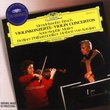| All Artists: Johannes Brahms, Richard [Classical] Wagner, Jascha Horenstein, SWR Baden-Baden and Freiburg Symphony Orchestra, Südwestfunkorchester Baden-Baden, Bamberg Symphony Orchestra Title: Brahms: Symphony No. 3; Wagner: Overtures to Tannhauser & Meistersinger Members Wishing: 0 Total Copies: 0 Label: Vox (Classical) Release Date: 7/11/2000 Genre: Classical Styles: Opera & Classical Vocal, Symphonies Number of Discs: 1 SwapaCD Credits: 1 UPC: 047163780226 |
Search - Johannes Brahms, Richard [Classical] Wagner, Jascha Horenstein :: Brahms: Symphony No. 3; Wagner: Overtures to Tannhauser & Meistersinger
 | Johannes Brahms, Richard [Classical] Wagner, Jascha Horenstein Brahms: Symphony No. 3; Wagner: Overtures to Tannhauser & Meistersinger Genre: Classical
|
Larger Image |
CD DetailsSimilarly Requested CDs
|
CD ReviewsHooked on Horenstein Once Again Michael B. Richman | Portland, Maine USA | 06/11/2005 (4 out of 5 stars) "A few years back I became aware of the great conductor Jascha Horenstein, so I quickly purchased (and reviewed) many of his CDs on the Vox label. Recently I discovered lots of these discs were available for only $1.99 at the Berkshire Record Outlet, so needless to say I picked up all the remaining titles I didn't own. One of them was this disc featuring Brahms' Symphony No. 3, with the Symphony Orchestra of the Southwest German Radio Baden-Baden in stereo from 1958, and Wagner's Prelude to Die Meistersinger von Nurnberg and Tannhauser Overture, both with the Bamberg Symphony Orchestra in mono from 1954. The Brahms 3rd performance is quite good, but personally I thought Horenstein's Brahms 1st, on a separate disc which I bought and listened to at the same time as this one, was better overall. The Wagner is enjoyable as well but considering the Vox stereo performances only sound decent in general, the mono leaves even more to be desired. But considering the price I paid (check out Berkshire for yourself!) what is there to complain about." Fascinating Brahms from Horenstein Johannes Climacus | Beverly, Massachusetts | 10/03/2008 (4 out of 5 stars) "Vox has done collectors a great favor by reissuing its Jascha Horenstein series from the early LP era. Horenstein never landed a long-term recording contract with a major label or a major orchestra, and that makes the Vox series even more precious.
Horenstein has a distinctive approach to Brahms: moody, unpredictable, unsettling. Horenstein's Brahms is by no means the musical equivalent of a plush, comfortable recliner or a hot tub (check out Ormandy or Walter's stereo cycle for that). Instead, this Brahms Third is an arduous journey on an overgrown path in late Autumn. The leaves have fallen, the sky is lowering (will it rain or snow?), a gusty wind is blowing and climbing the steep track is effortful. There are consolations along the way, however. One is the gorgeous account of the third movement Intermezzo. It is as lovingly and meaningfully shaped as I have ever heard it. Much though I love Bruno Walter's rendition of this movement (in both his leaner Mono and more sumptuous Stereo recordings), I have to award the palm to Horenstein. I don't know how he manages to get the solo horn to sound exactly like some baleful, wounded animal calling to its mate through the mist of a chilly November afternoon, but the effect is both harrowing and tender at the same time. [Hear this for yourself, as you must if you love Brahms, and then supply your own analogies.] I wish I could be as enthusiastic about the finale, but it really is too deliberate--not only in pace but also in manner. Everything is "spelled out" so carefully (could it be care over a less than virtuosic ensemble?) that the wild and woolly passages (of which there are quite a few before the quiet, evanescent coda) lose their proper effect. The other movements, however, are quite good; maybe not on a par with Furtwängler (who is, at least in Brahms?) or Klemperer, but surprisingly close to their level of *Innigkeit*--and no praise could be higher. As indicated, the orchestral playing, though competent, is by no mens world-class. They give their best, however, and the results are always characterful if not as polished as one might wish. The wind playing (including the French horns) is beautifully sculpted and the strings, though hardly lush, can play with startling intensity at times. A distinctive, and often haunting rendition of the Brahms Third; worth anyone's time and money, particularly given the modest outlay. The Wagner couplings are also worthwhile, though the Viennese pick-up band sounds scrawny at times; they are hardly Meistersingers. Horenstein aficionados will want to hear these outings, however, if only because he recorded very little Wagner in the studio. The sound is rather coarse and grainy in the Brahms (not much benefit from the early Stereo), better focused but boxy in the Wagner. This is by no means an audiophile treat; though I doubt whether anyone reading this review will care a great deal about the sonics. If you are following Horenstein's career on record, then you must have this fascinating document." |

 Track Listings (6) - Disc #1
Track Listings (6) - Disc #1








